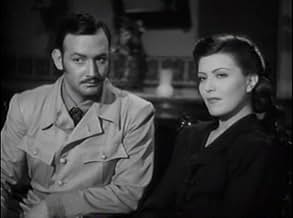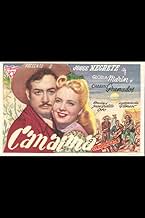Füge eine Handlung in deiner Sprache hinzuMarcos Vargas returns home to Ciudad Bolívar after finishing his studies in Caracas. There he decides to start a business transporting merchandise to the interior of the jungle. A local chie... Alles lesenMarcos Vargas returns home to Ciudad Bolívar after finishing his studies in Caracas. There he decides to start a business transporting merchandise to the interior of the jungle. A local chieftain will not make things easy for him.Marcos Vargas returns home to Ciudad Bolívar after finishing his studies in Caracas. There he decides to start a business transporting merchandise to the interior of the jungle. A local chieftain will not make things easy for him.
- Regie
- Drehbuch
- Hauptbesetzung
- Auszeichnungen
- 2 Gewinne & 3 Nominierungen insgesamt
Vincent Padula
- Vellorini el bueno (don Francisco)
- (as Vicente Padula)
June Byron
- Carmen
- (as Diana Montez)
Empfohlene Bewertungen
These type of movies can be seen time after time with the same interest as in the first time you saw them. CANAIMA is very similar in its settings to DONA BARBARA, another Mexican film made by Maria Felix back in the same time frame, the mid 1940's. Both movies are based on novels written by Venezuela's greatest writer, Romulo Gallegos. The surroundings for these 2 great movies is the same, Venezuela jungles and immense savannahs. The fact that a few persons held the richness of that Country and the vast majority of their people were illiterate and poor, plus the fact that men were supposed to be "macho" in order to survive, made these movies very profound in their philosophy. DONA BARBARA, even when she was a woman, survived because she was "macho". It couldn't be otherwise. The "law of the jungle" was the law and the powerful used their strength to subdue their people. These 2 movies are best enjoyed when seen in Spanish. The richness and great control of this language that Gallegos had, including the slang and local expressions plus the "inside" knowledge of the fears and anxieties of the Venezuelan peasants of those times, made following the dialogs an exquisite experience. I recommend both pictures without any reserves, specially if you speak the Spanish language.
I've read Romulo Gallegos' book translated in my language (Slovenian) and I was fascinated with deep characterizations deriving from fewest possible dialogs and the philosophy of a life, driven by honest instincts, liberal thinking and wide fan of feelings of a man torn between duty to his roots and environment imposed on him. In the movie, dating 10 years after the book, all those subtle tones are lost in a Hollywood-like display of a black-and-white hero and much much talking. From the technical point of view, the movie is almost perfect, great cinematography, music and direction, even much altered dramaturgy (storyline) is good, as it is adapted to a different medium (film). But it shows here, how written word made much more progress to this point in history than moving pictures. The novel even today isn't out-of-date, whereas the movie plays rather like a curiosity and display of good filming techniques of the time, than a work with some weight, especially intimately expressed ideas, that were also recognized widely by the Venezuelan people after the book was published(Venezuela being homeland of both Gallegos and Marcos Vargas, hero of the novel/movie.) But it is not an excuse to make an average movie out of a perfect book, just because a canon of making movies was such and such in those times. This movie was made in Mexico, so please look at Bunuel's early work and compare, and one other example comes to mind: Mizoguchi's 47 Ronin from 1941 (!) is a great example of how a simple story, told before a hundred times, can live forever on a new medium if there is a genus at work.
If there is someone from Venezuela who wishes to comment on the movie and on my comment, please do so, I would like to hear how you see it.
If there is someone from Venezuela who wishes to comment on the movie and on my comment, please do so, I would like to hear how you see it.
Wusstest du schon
Top-Auswahl
Melde dich zum Bewerten an und greife auf die Watchlist für personalisierte Empfehlungen zu.
Details
- Erscheinungsdatum
- Herkunftsland
- Sprache
- Auch bekannt als
- El Dios del mal
- Drehorte
- Produktionsfirma
- Weitere beteiligte Unternehmen bei IMDbPro anzeigen
- Laufzeit1 Stunde 58 Minuten
- Farbe
- Sound-Mix
Zu dieser Seite beitragen
Bearbeitung vorschlagen oder fehlenden Inhalt hinzufügen


















